
A Vindication of the Rights of Woman: with Strictures on Political and Moral Subjects (1792), written by British philosopher and women's rights advocate Mary Wollstonecraft (1759–1797), is one of the earliest works of feminist philosophy. In it, Wollstonecraft responds to those educational and political theorists of the eighteenth century who did not believe women should receive a rational education. She argues that women ought to have an education commensurate with their position in society, claiming that women are essential to the nation because they educate its children and because they could be "companions" to their husbands, rather than mere wives. Instead of viewing women as ornaments to society or property to be traded in marriage, Wollstonecraft maintains that they are human beings deserving of the same fundamental rights as men.
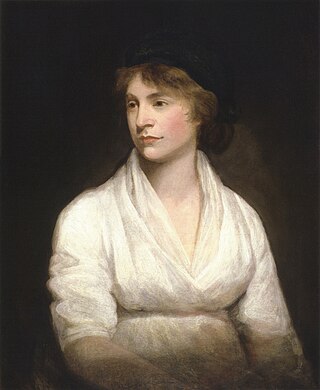
Mary Wollstonecraft was a British writer, philosopher, and advocate of women's rights. Until the late 20th century, Wollstonecraft's life, which encompassed several unconventional personal relationships at the time, received more attention than her writing. Wollstonecraft is regarded as one of the founding feminist philosophers, and feminists often cite both her life and her works as important influences.

William Godwin was an English journalist, political philosopher and novelist. He is considered one of the first exponents of utilitarianism and the first modern proponent of anarchism. Godwin is most famous for two books that he published within the space of a year: An Enquiry Concerning Political Justice, an attack on political institutions, and Things as They Are; or, The Adventures of Caleb Williams, an early mystery novel which attacks aristocratic privilege. Based on the success of both, Godwin featured prominently in the radical circles of London in the 1790s. He wrote prolifically in the genres of novels, history and demography throughout his life.

Hannah More was an English religious writer, philanthropist, poet, and playwright in the circle of Johnson, Reynolds and Garrick, who wrote on moral and religious subjects. Born in Bristol, she taught at a school her father founded there and began writing plays. She became involved in the London literary elite and a leading Bluestocking member. Her later plays and poetry became more evangelical. She joined a group opposing the slave trade. In the 1790s she wrote Cheap Repository Tracts on moral, religious and political topics, to distribute to the literate poor. Meanwhile, she broadened her links with schools she and her sister Martha had founded in rural Somerset. These curbed their teaching of the poor, allowing limited reading but no writing. More was noted for her political conservatism, being described as an anti-feminist, a "counter-revolutionary", or a conservative feminist.
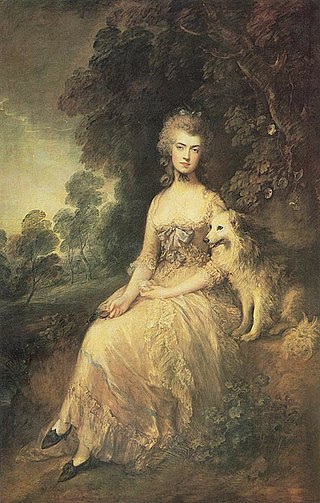
Mary Robinson was an English actress, poet, dramatist, novelist, and celebrity figure. She lived in England, in the cities of Bristol and London; she also lived in France and Germany for a time. She enjoyed poetry from the age of seven and started working, first as a teacher and then as actress, from the age of 14. She wrote many plays, poems and novels. She was a celebrity, gossiped about in newspapers, famous for her acting and writing. During her lifetime she was known as "the English Sappho". She earned her nickname "Perdita" for her role as Perdita in 1779. She was the first public mistress of King George IV while he was still Prince of Wales.

Thomas Taylor was an English translator and Neoplatonist, the first to translate into English the complete works of Aristotle and of Plato, as well as the Orphic fragments.
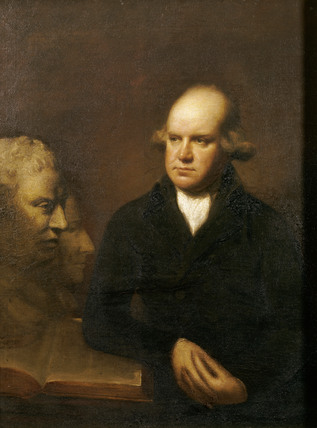
Sir Herbert Croft, 5th Baronet, English author best known for his novel Love and Madness.

A Vindication of the Rights of Men, in a Letter to the Right Honourable Edmund Burke; Occasioned by His Reflections on the Revolution in France (1790) is a political pamphlet, written by the 18th-century British writer and women's rights advocate Mary Wollstonecraft, which attacks aristocracy and advocates republicanism. Wollstonecraft's was the first response in a pamphlet war sparked by the publication of Edmund Burke's Reflections on the Revolution in France (1790), a defense of constitutional monarchy, aristocracy, and the Church of England.
Mary Hays (1759–1843) was an autodidact intellectual who published essays, poetry, novels and several works on famous women. She is remembered for her early feminism, and her close relations to dissenting and radical thinkers of her time including Robert Robinson, Mary Wollstonecraft, William Godwin and William Frend. She was born in 1759, into a family of Protestant dissenters who rejected the practices of the Church of England. Hays was described by those who disliked her as 'the baldest disciple of [Mary] Wollstonecraft' by The Anti Jacobin Magazine, attacked as an 'unsex'd female' by clergyman Robert Polwhele, and provoked controversy through her long life with her rebellious writings. When Hays's fiancé John Eccles died on the eve of their marriage, Hays expected to die of grief herself. But this apparent tragedy meant that she escaped an ordinary future as wife and mother, remaining unmarried. She seized the chance to make a career for herself in the larger world as a writer.
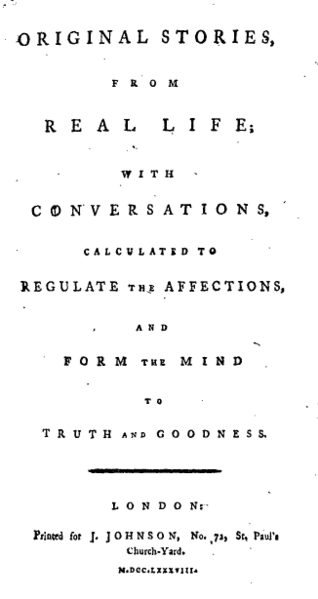
Original Stories from Real Life; with Conversations Calculated to Regulate the Affections, and Form the Mind to Truth and Goodness is the only complete work of children's literature by the 18th-century English feminist author Mary Wollstonecraft. Original Stories begins with a frame story that sketches out the education of two young girls by their maternal teacher Mrs. Mason, followed by a series of didactic tales. The book was first published by Joseph Johnson in 1788; a second, illustrated edition, with engravings by William Blake, was released in 1791 and remained in print for around a quarter of a century.

Mary: A Fiction is the only complete novel by 18th-century British feminist Mary Wollstonecraft. It tells the tragic story of a woman's successive "romantic friendships" with a woman and a man. Composed while Wollstonecraft was a governess in Ireland, the novel was published in 1788 shortly after her summary dismissal and her decision to embark on a writing career, a precarious and disreputable profession for women in 18th-century Britain.

Maria: or, The Wrongs of Woman is Mary Wollstonecraft's unfinished novelistic sequel to her revolutionary political treatise A Vindication of the Rights of Woman (1792). The Wrongs of Woman was published posthumously in 1798 by her husband, William Godwin, and is often considered her most radical feminist work.

Thoughts on the education of daughters: with reflections on female conduct, in the more important duties of life is the first published work of the British feminist Mary Wollstonecraft. Published in 1787 by her friend Joseph Johnson, Thoughts is a conduct book that offers advice on female education to the emerging British middle class. Although dominated by considerations of morality and etiquette, the text also contains basic child-rearing instructions, such as how to care for an infant.
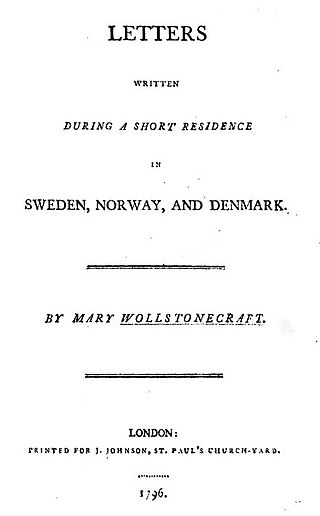
Letters Written During a Short Residence in Sweden, Norway, and Denmark (1796) is a personal travel narrative by the eighteenth-century British feminist writer Mary Wollstonecraft. The twenty-five letters cover a wide range of topics, from sociological reflections on Scandinavia and its peoples to philosophical questions regarding identity. Published by Wollstonecraft's career-long publisher, Joseph Johnson, it was the last work issued during her lifetime.
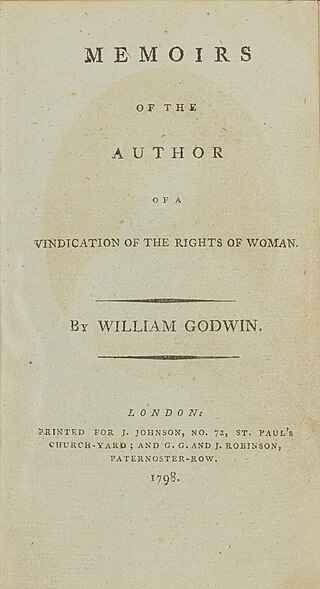
Memoirs of the Author of A Vindication of the Rights of Woman (1798) is William Godwin's biography of his late wife Mary Wollstonecraft. Rarely published in the nineteenth century and sparingly even today, Memoirs is most often viewed as a source for information on Wollstonecraft. However, with the rise of interest in biography and autobiography as important genres in and of themselves, scholars are increasingly studying it for its own sake.
Phebe Gibbes was an 18th-century English novelist and early feminist. She authored twenty-two books between 1764 and 1790, and is best known for the novels The History of Mr. Francis Clive (1764), The Fruitless Repentance; or, the History of Miss Kitty Le Fever (1769), and The History of Miss Eliza Musgrove (1769). She received recent attention with the scholarly publication of Hartly House Calcutta (1789) in 2007.
Lady Mary Hamilton or Lady Mary Walker was a Scottish novelist of the 18th century. She was the youngest daughter of Alexander Leslie, 5th Earl of Leven and the mother of James Walker, a Rear admiral in the British Royal Navy.
Alexander Bicknell, author, was an industrious littérateur of the last quarter of the eighteenth century, whose writings received ridicule or faint praise in the British periodical Monthly Review. It has been suggested that he also wrote under the pseudonym of Mrs Elizabeth Steele. He died 22 August 1796 in St. Thomas's Hospital, London.
Edmund Rack, born in Norfolk, England, became well known in Bath, Somerset; he was a writer, particularly about agriculture, and founded notable societies.

Mothers of the Novel: 100 Good Women Writers Before Jane Austen (1986), by Dale Spender, is a foundational study for the reclamation project central to feminist literary studies in English in the late 1980s and 1990s.















